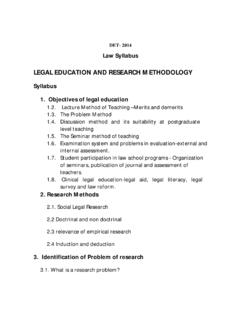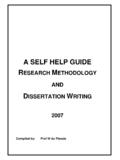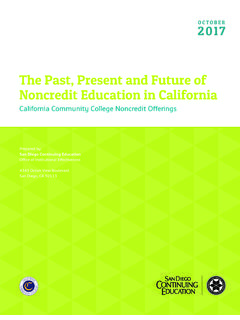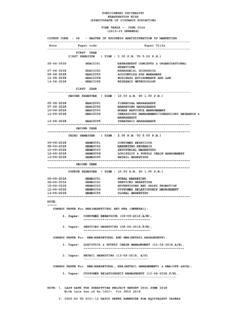Transcription of Treatment of Applied Behavioral Analysis Under IDEA
1 Treatment of Applied Behavioral Analysis Under IDEA: Has Recent Peer-Reviewed Support for Intensive Behavioral Approaches Given Parents a 1. Right to ABA Services for Children with Autism? 2010 - Robert K. Crabtree, Esq. Kotin, Crabtree & Strong, LLP. One Bowdoin Square Boston, Massachusetts 02114-2919. Science builds consensus among people in a way that few other disciplines can, if only because the nature of its proofs makes dissent so difficult. The path to consensus via science is rarely straight; it can take years to achieve and the battles can be bloody.
2 But eventually, the accumulation of evidence is hard, even impossible, to I. The Issue: Parents of children with autism and their advocates have been encouraged by recent additions to the scientific literature that clearly support the use of intensive Behavioral approaches typically referred to as Applied Behavioral Analysis , or ABA in the education of such children. They hope that the increasing scientific support for ABA will lead judges and hearing officers to order the use of ABA more frequently than they have to date, in place of more eclectic models of teaching used by many school districts.
3 There is reason for 1. I much appreciate the assistance provided by Northeastern University School of Law student clerks, Adam Minsky and Peter Fisher, who ably researched some of the issues discussed in this piece and helped think through and clarify the implications of IDEA's new emphasis on supporting where practicable scientifically based teaching methodologies for children with disabilities. 2. Chester E. Finn, Jr. & Martin A. Davis, Jr., Foreword to LOUISA MOATS, WHOLE-LANGUAGE HIGH JINKS: HOW TO. TELL WHEN SCIENTIFICALLY-BASED READING INSTRUCTION ISN'T, 6, 6 (Jan.)
4 2007), 1 some very cautious optimism, but given the history of deference typically extended to school districts in their choice of instruction methods, parents and practitioners should not expect that ABA will become the default methodology in the minds of judges and hearing officers any time soon. Many school districts will likely continue to oppose what they view as costly and labor-intensive interventions and, as long as there are any arguable scientific bases on which other, less expensive methodologies can be supported, IDEA will likely continue for some time yet to lean in the districts' direction in such matters.
5 II. The Legal Context Under IDEA: The Individuals with Disabilities Education Act ( IDEA ), requires states to provide a free appropriate public education ( FAPE ) to all students whose disabilities undermine their school performance and who need specialized instruction and/or related services to make meaningful Educational progress has been interpreted to mean more than strictly academic progress and includes other aspects of a child's development including social, emotional and Behavioral skills,4 as long as whatever non- academic issues are at stake are not truly distinct from learning problems.
6 5 The vehicle for providing FAPE is a written individualized educational program ( IEP ) developed by a team of educators and parents of a student with Courts have held that IDEA requires school districts to provide an IEP that is reasonably calculated to enable the student to make meaningful educational progress but does not require that districts maximize a student's potential or provide the best educational program (States are free to establish a higher standard of protection for students with disabilities than is 3. Individuals with Disabilities Education Act (IDEA), 20 1401(3), (9) (2008).)
7 4. See Lenn v. Portland Sch. Comm, 998 1083, 1089-90 (1st Cir. 1993). 5. Gonzalez v. Dep't of Educ., 254 350, 352 (1st Cir. 2001) (internal quotations omitted). 6. Id.; IDEA 1414(d). 7. See Bd. of Educ. v. Rowley, 458 176, 198 (1982). 2 afforded by the IDEA's standards; any such higher standard is enforced as part of IDEA in cases concerning residents of those states.)8 Thus, in disputes between parents and school districts concerning whether a student with a disability is receiving appropriate educational services Under the IDEA, administrative hearing officers who adjudicate disputes between parents and school districts, and judges in district and appellate courts who hear those cases on occasions when they are appealed, will rule for the school district if the district presents sufficient evidence that its educational program is reasonably calculated to provide a meaningful educational benefit.
8 When parents are the moving party (as they most often are, in due process proceedings), the burden of proof is on parents and their supporting special education practitioners to show that a school district's educational program fails to provide a FAPE. If and when they satisfy that burden, the parents must then also show that the program or services that they seek would meet the IDEA. standard before a hearing officer or court will order the school district to provide that service or program. III. How Adjudicators Have Treated Disputes Pitting ABA Against Other Methodologies: Courts and hearing officers have consistently held that the IDEA does not require any particular methodology to educate children with disabilities.
9 They defer to school districts to select teaching approaches and accommodations, and they will uphold a district's methods as long as those methods are reasonably calculated to help the particular student learn what s/he needs to learn. Importantly, the district's approaches need not be the best available methodologies. 8. See , Gill v. Columbia 93 Sch. Dist., 217 1027, 1035 (8th Cir. 2000) (noting that if a state legislature chooses to require more for its program, the state standard must be met in order to obtain federal special education funds.)
10 ; Johnson v. Indep. Sch. Dist. No. 4 of Bixby, 921 1022, 1029 (10th Cir. 1990) (finding that a state's special education statute defines the parameters of a school district's legal obligations to its students). 3 The IDEA was amended in 2004 to require that services included in an IEP. be based on peer-reviewed research to the extent practicable, 9 but the effects of that change in the IDEA's requirements should not be exaggerated. For scientific research in fields involving such ambiguous subjects as educational and developmental progress in young children, there may never be absolute certainty about the effectiveness of one teaching methodology or another.



